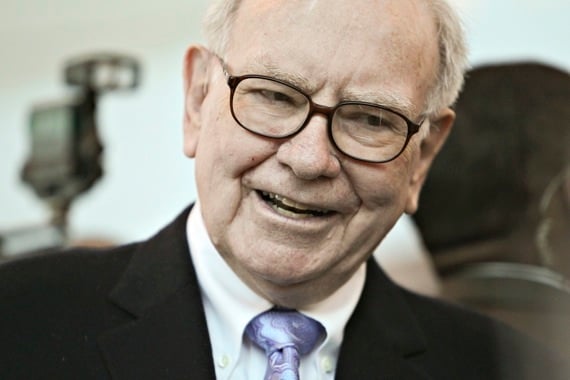Survey shows 53% back the Buffett rule to narrow the deficit; are candidates listening?
More than two-thirds of Americans, including a majority of Republicans, say wealthier people should pay more in taxes to bring down the budget deficit, and even larger numbers think Medicare and Social Security benefits should be left alone.
That sentiment on taxes is at odds with the Republican presidential candidates, who will meet tonight in a Bloomberg- Washington Post-sponsored debate focused on economic issues.
More than 8 out of 10 Americans say the middle class will have to make financial sacrifices to cut the federal deficit even as the public just as strongly opposes higher taxes on middle-income families, according to a Bloomberg-Washington Post national poll conducted Oct. 6-9.
“While Americans see sacrifice as inevitable for the middle-class, the only sacrifice to win majority support is a tax on those too wealthy to be considered middle-class,” says J. Ann Selzer, president of Des Moines, Iowa-based Selzer & Co., which consults with Bloomberg News on polls.
The Republican candidates will address the budget deficit among the issues covered in tonight's debate at Dartmouth College in Hanover, New Hampshire, that will be the first of the campaign to focus on the economy. The event beginning at 8 p.m. Washington time will be broadcast on Bloomberg Television, Bloomberg Radio, and New Hampshire's television station WBIN-TV.
Split on Defense
The poll also underscored differences between Republican supporters and the rest of the nation on the burden the military should bear in righting the country's fiscal situation, with 61 percent of party backers opposing defense cuts, while 60 percent of Democrats and 58 percent of independents support them.
While none of the Republican presidential candidates has backed a tax increase on households with more than $250,000 in annual income, 53 percent of self-identified Republicans said they would support such a measure to bring down the deficit.
The poll also underscores how unsettled the public mood is on the economy. More than half of all Americans think another financial crisis is likely within the next couple of years. Much of the nation doubts the winner of the presidential race will affect the economic situation or their personal finances, and those who do are about evenly split over who would do better.
An almost 2-to-1 majority rejects one remedy proposed by former Massachusetts Governor Mitt Romney to increase the number of legal immigration visas available to foreigners with advanced degrees in math, science or engineering. That idea is even less popular among Republicans and Republican-leaning independents, with 63 percent opposed and 27 percent in favor.
Perry Battered
Some business executives say their companies can't find suitable workers to fill high-skill job vacancies.
Anti-immigration sentiment has battered Texas Governor Rick Perry's campaign for the party's nomination. Romney and other Republican rivals have seized on Perry's support for a Texas law allowing children of illegal immigrants who are admitted to public universities to attend at lower state-resident tuition rates, to portray him as lax on an issue that stirs resentment among some Republican voters.
As the candidates prepare to meet tonight, former Godfather's Pizza chief executive Herman Cain has pulled almost even with Romney on the question of who would do the most to improve the economy, among Republicans and Republican-leaning independents. Twenty-two percent of the party's supporters picked Romney, 20 percent Cain, and 12 percent Perry.
‘9-9-9'
Cain has promoted a simple “9-9-9” economic plan that would replace the current tax structure with 9 percent flat corporate and individual income tax rates and a 9 percent national sales tax. Romney, who founded Boston-based private equity firm Bain Capital LLC, has stressed his business background and a 59-point economic program.
Republican supporters expressed the greatest reservations about the economic credentials of U.S. Representative Michele Bachmann of Minnesota. Fourteen percent said she would do the most damage to the economy, followed by 11 percent who named Representative Ron Paul of Texas and 9 percent Perry.
While Romney barely leads on the economy, he maintains his overall advantage as the candidate Republican supporters most want to see as the nominee, at 24 percent, with Cain second at 16 percent and Perry third at 13 percent.
Rounding out the field, 6 percent of the party's supporters back Paul, 4 percent Bachmann, 3 percent former House Speaker Newt Gingrich, 1 percent former Senator Rick Santorum and less than 1 percent former U.S. Ambassador to China Jon Huntsman.
Cool Toward Parties
Neither political party has yet persuaded the country of its economic case either.
More than half of Americans either believe the current economic situation would be the same with a Republican in the White House instead of President Barack Obama or say they don't know which party would do a better job. The rest are about evenly divided, with 23 percent saying a Republican president would manage the economy better versus 25 percent who say a Republican president would be worse.
Among political independents, 55 percent said it makes no difference and 7 percent said they didn't know the answer.
A similar breakdown shows when Americans are asked how the result of the 2012 presidential election will affect their personal financial situation. Forty-nine percent say they don't know or don't believe the president will make a difference. Twenty-four percent say Obama's re-election would be better, and the same portion say the victory of a Republican would do more for their own finances.
New Crisis Seen
The portion of the country that believes a financial crisis is likely within the next several years has risen to 52 percent from 42 percent in March 2010, when the question was last asked in a Bloomberg National Poll.
The Bloomberg-Washington Post poll surveyed 1,000 Americans by telephone. The margin of error for overall numbers is plus or minus 3.5 percentage points. The poll covered 391 Republicans and Republican-leaning independents with a margin of error of plus or minus 6 percentage points for that group.
--Bloomberg News--







